Related Research Articles

The Sri Lankan Civil War was a civil war fought in Sri Lanka from 1983 to 2009. Beginning on 23 July 1983, it was an intermittent insurgency against the government by the Velupillai Prabhakaran-led Liberation Tigers of Tamil Eelam. The LTTE fought to create an independent Tamil state called Tamil Eelam in the north-east of the island, due to the continuous discrimination and violent persecution against Sri Lankan Tamils by the Sinhalese-dominated Sri Lanka government.

The United Nations Human Rights Council (UNHRC) is a United Nations body whose mission is to promote and protect human rights around the world. The Council has 47 members elected for staggered three-year terms on a regional group basis. The headquarters of the Council are at the United Nations Office at Geneva in Switzerland.
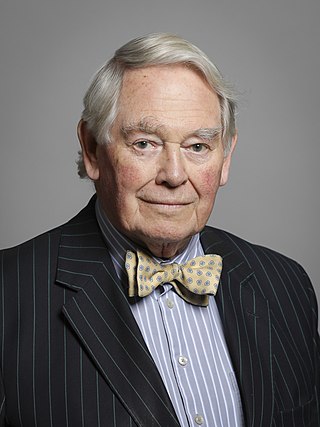
Michael Wolfgang Laurence Morris, Baron Naseby, is a British Conservative Party politician.

Lyal S. Sunga is a well-known specialist on international human rights law, international humanitarian law and international criminal law.
The UNROW Human Rights Impact Litigation Clinic is a student litigation and advocacy project at American University's Washington College of Law.
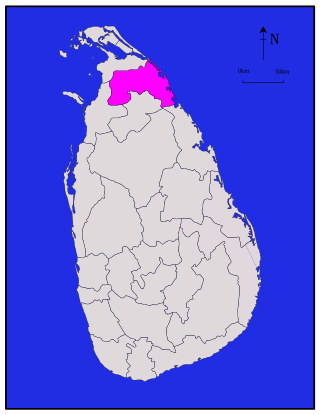
Mullivaikal Hospital was a makeshift hospital located in the Safe Zone in northern Sri Lanka. An alleged series of shellings and aerial attacks began on 23 April 2009 when the Mullivaikal Hospital was hit by three artillery shells. It continued on 28 and 29 April when the Mullivaikkal Primary Health Center was hit multiple times over a two-day period with six killed and many injured including one medical staffer. On the 29th and the 30th the Mullivaikal Hospital was again hit multiple times with nine more killed and fifteen injured. There were two attacks against the Mullivaikal Hospital on 2 May, one at 9 a.m. and a second at 10.30 a.m. resulting in sixty-eight killed and eighty-seven wounded, including medical staffers. On the morning of 12 May 2009 it was hit by an artillery mortar, killing at least forty-nine patients and injuring more than fifty others. All of these attacks were allegedly by the Sri Lankan Army; however, the Sri Lankan Government denied the allegation stating there is no evidence.
War crimes during the final stages of the Sri Lankan Civil War are war crimes and crimes against humanity which the Sri Lanka Armed Forces and the Liberation Tigers of Tamil Eelam have been accused of committing during the final months of the Sri Lankan Civil War in 2009. The war crimes include attacks on civilians and civilian buildings by both sides; executions of combatants and prisoners by both sides; enforced disappearances by the Sri Lankan military and paramilitary groups backed by them; sexual violence by the Sri Lankan military; the systematic denial of food, medicine, and clean water by the government to civilians trapped in the war zone; child recruitment, hostage taking, use of military equipment in the proximity of civilians and use of forced labor by the Tamil Tigers.
The Lessons Learnt and Reconciliation Commission was a commission of inquiry appointed by Sri Lankan President Mahinda Rajapaksa in May 2010 after the 26-year-long civil war in Sri Lanka to function as a Truth and reconciliation commission. The commission was mandated to investigate the facts and circumstances which led to the failure of the ceasefire agreement made operational on 27 February 2002, the lessons that should be learnt from those events and the institutional, administrative and legislative measures which need to be taken in order to prevent any recurrence of such concerns in the future, and to promote further national unity and reconciliation among all communities. After an 18-month inquiry, the commission submitted its report to the President on 15 November 2011. The report was made public on 16 December 2011, after being tabled in the parliament.
The Report of the Secretary-General's Panel of Experts on Accountability in Sri Lanka was a 2011 report produced by a panel of experts appointed by United Nations Secretary-General (UNSG) Ban Ki-moon to advise him on the issue of accountability with regard to any alleged violations of international human rights and humanitarian law during the final stages of the Sri Lankan Civil War. The report is referred to by some as the Darusman Report, after the name of the chairman of the panel.
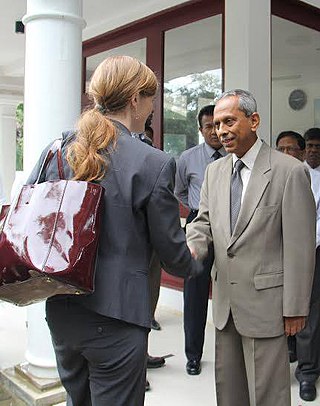
Hewa Matara Gamage Siripala Palihakkara is a Sri Lankan civil servant, diplomat and former Governor of Northern Province.
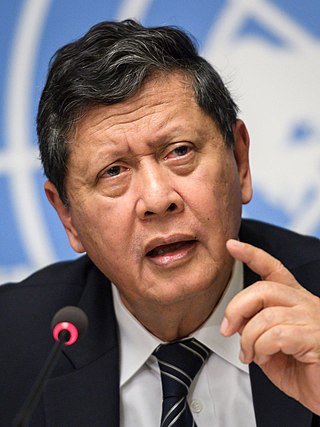
Marzuki Darusman is an Indonesian lawyer and human rights campaigner who served as the Attorney General of Indonesia from 1999 to 2001. He currently serves as the chairman of an UN Human Rights Council mission on Myanmar since July 2017. He is the Director-General of the Human Rights Resource Centre for ASEAN.
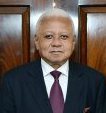
Mohamed Chande Othman is a Tanzanian lawyer and a former Chief Justice of Tanzania.
Mullivaikkal massacre was the mass killing of tens of thousands of Sri Lankan Tamils in 2009 during the closing stages of the Sri Lankan Civil War ending in May 2009 in a tiny strip of land in Mullivaikkal, Mullaitivu. The Sri Lankan government designated a no fire zone in Mullivaikkal towards the end of the war. According to the UN, between 40,000–70,000 entrapped Tamil civilians were killed by the actions of Government Forces and LTTE, with the large majority of these civilian deaths being the result of indiscriminate shelling by the Sri Lankan Armed Forces.
Yasmin Louise Sooka is a leading human rights lawyer, the Executive Director of the Foundation for Human Rights in South Africa and a trustee of the Desmond Tutu Peace Centre. She was born in Cape Town, South Africa, and got a law degree from the University of the Witwatersrand. She is an expert on transitional justice, gender and international war crimes.

The Office of the Special Representative of the Secretary-General on Sexual Violence in Conflict (OSRSG-SVC) is an office of the United Nations Secretariat tasked with serving the United Nations' spokesperson and political advocate on conflict-related sexual violence, the Special Representative of the Secretary-General on Sexual Violence in Conflict (SRSG-SVC). The Special Representative holds the rank of Under-Secretary-General of the UN and chairs the UN Action Against Sexual Violence in Conflict. The mandate of the SRSG-SVC was established by Security Council Resolution 1888, introduced by Hillary Clinton, and the first Special Representative, Margot Wallström, took office in 2010. The current Special Representative is Pramila Patten of Mauritius, who was appointed by UN Secretary General António Guterres in 2017. The work of the SRSG-SVC is supported by the UN Team of Experts on the Rule of Law/Sexual Violence in Conflict, co-led by the Department of Peacekeeping Operations (DPO), Office of the High Commissioner for Human Rights (OHCHR) and the UN Development Programme (UNDP), also established under Security Council Resolution 1888.
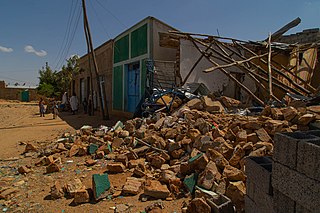
All sides of the Tigray War have been repeatedly accused of committing war crimes since it began in November 2020. In particular, the Ethiopian federal government, the State of Eritrea, the Tigray People's Liberation Front (TPLF) and Amhara regional forces have been the subject of numerous reports of both war crimes and crimes against humanity.

The EHRC–OHCHR Tigray investigation is a human rights investigation launched jointly by the Ethiopian Human Rights Commission (EHRC) and the Office of the United Nations High Commissioner for Human Rights (OHCHR) in mid-2021 into human rights violations of the Tigray War that started in November 2020. The EHRC–OHCHR joint investigation team's report was published on 3 November 2021.
The Independent International Commission of Inquiry in Ukraine is a United Nations commission of inquiry established by the United Nations Human Rights Council on 4 March 2022 with a mandate to investigate violations of human rights and of international humanitarian law in the 2022 Russian invasion of Ukraine. The Commission delivered its reports on 18 October 2022 and 16 March 2023.
Ponnampalam Memorial hospital is located in Puthukudiyiruppu in Mullaitivu District.It was run by the LTTE in rebel controlled areas. It was bombed by the Sri Lankan airforce and the hospital was destroyed. Human Rights Watch accused the Sri Lankan military of shelling hospitals in the Safe Zone indiscriminately with artillery and attacking them aerially beginning with the Mullaitivu General Hospital in December 2008 and including at least eight other hospitals. Human Rights Watch stated that these attacks constitute war crimes. They've also said that the hospitals are clearly marked.Report of the Secretary-General's Panel of Experts on Accountability in Sri Lanka found that the allegations that the Sri Lankan military shelled hospitals were credible.Gotabaya Rajapakse claimed that "No hospital should operate outside the Safety Zone...everything beyond the safety is a legitimate target," and stating the attack was legitimate. US Secretary of State Hillary Clinton and British Foreign Secretary David Miliband jointly called on the warring parties in the island of Sri Lanka to "not to fire out of or into" the safe zone and in the "vicinity of Puthukkudiyiruppu (PTK) hospital or any other medical structure".
The International Commission of Human Rights Experts on Ethiopia (ICHREE) was established by the UN Human Rights Council in December 2021. The mandate of the commission is to investigate allegations of violations and abuses of international human rights law, humanitarian law and refugee law in Ethiopia committed since 3 November 2020 by all parties to the conflict. The Commission comprises three human rights experts and is appointed for a renewable one-year term. In October 2022 at the Human Rights Council's 51st session, the Commission's mandate was extended to December 2023.
References
- 1 2 "Legal People > Detroit Legal News". legalnews.com. Retrieved 2023-12-03.
- ↑ "Steven R. Ratner". University of Michigan Law School. 22 Nov 2022. Retrieved 21 Oct 2023.
- ↑ "Steven Ratner". U-M LSA International Institute. Retrieved 21 Oct 2023.
- ↑ The Peninsula Newspaper (9 Apr 2019). "HBKU to explore arbitration of Human Rights disputes". The Peninsula Qatar. Retrieved 21 Oct 2023.
- ↑ "OHCHR | International Commission of Human Rights Experts on Ethiopia". OHCHR. Retrieved 2022-12-26.
- ↑ Jamey Keaten; Rodney Muhumuza (4 October 2023), UN-backed probe into Ethiopia's abuses is set to end. No one has asked for it to continue, Associated Press, Wikidata Q124059881, archived from the original on 1 January 2024